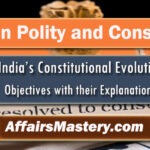Comprehensive Indian Constitutional Articles and Schedules MCQs | Set 4
Unlock Your Knowledge: Comprehensive and Important MCQs on Indian Constitution Articles and Schedules. Articles and Schedules plays a huge role in shaping Indian Polity and Governance, and it’s one of those things that really lays the groundwork for doing well in competitive exams—whether it’s Civil Services, State exams, SSC, Railways, Banking, or any of the others out there.
Diving deep into Indian Polity, Constitution, and governance isn’t just about memorizing facts or ticking boxes for exams, but more about developing the kind of awareness that can make navigating these challenging exams a little less overwhelming and a lot more manageable.
| MCQs on Indian Constitution Articles and Schedules – Objective Questions and Answers |

Q31. Which List and Entry of Seventh Schedule of Indian Constitution is related to election of the legislature of the State? (M.P.P.C.S. (Pre) 2020)
[A] List–I, Entry 72
[B] List – II, Entry 27
[C] List -II, Entry 37
[D] List – III, Entry 32
View Explanation
Correct Answer is A & C.
- The 7th Schedule of the Indian Constitution is all about splitting up the powers between the Union and the State governments.
- If we look at List-1, Entry 72, it covers elections for the Parliament, State legislatures, and the offices of the President and Vice-President, along with the Election Commission.
- Then, in List-II, Entry 37, it talks about elections to the Legislature of the State but also notes that it is subject to any laws made by Parliament.
- So, in reality, both Option A and Option C are correct.
- This seems to be what the official MPPSC answer key says, which is why it includes both options.
- A little tricky, but it’s all about the specific way these entries work together and how Parliament can step in with laws for State elections.
Q32. Which of the following Subject lies in the Concurrent List? (47th B.P.S.C. (Pre) 2005)
[A] Agriculture
[B] Education
[C] Police
[D] Defence
View Explanation
Correct Answer is B.
- Education is a subject that falls under the Concurrent List in the Seventh Schedule of the Indian Constitution.
- This means both the Union and State governments can legislate on education, though in case of conflict, Union law prevails.
The other subjects:
- Agriculture is in the State List.
- Police is in the State List.
- Defence is in the Union List.
Q33. Which one of the given Subjects is not correctly matched with their List (U.P.P.C.S. (Pre) 2009, 2010)
Subject List
[A] Forest -> Concurrent
[B] Stock Exchange -> Concurrent
[C] Post Office Saving Bank -> Union
[D] Public Health -> State
View Explanation
Correct Answer is B.
- Stock Exchange actually falls under the Union List and not the Concurrent List.
- The regulation of stock exchanges and futures markets is a subject exclusively dealt with by the Union government.
Other options:
- Forest -> Concurrent: Correct. Forests are listed in the Concurrent List, meaning both the Union and States can legislate on the matter.
- Post Office Saving Bank -> Union: Correct. This falls under the Union List as postal services are a Union subject.
- Public Health -> State: Correct. Public health is a subject in the State List, and states are primarily responsible for it.
Q34. Which one of the following Schedules of the Constitution of India contains provisions regarding Anti-defection law? (I.A.S. (Pre) 1998, 2014)
[A] Second Schedule
[B] Fifth Schedule
[C] Eighth Schedule
[D] Tenth Schedule
View Explanation
Correct Answer is D.
- The Tenth Schedule of the Indian Constitution deals with provisions regarding Anti-defection law.
- It lays down the rules for disqualification of members of Parliament and State Legislatures on grounds of defection, ensuring that legislators cannot switch parties freely without consequences.
Q35. Which one of the following is not included in the Union List in the Seventh Schedule of the Indian Constitution- (U.P.P.C.S. (Pre) 1997)
[A] Banking
[B] Insurance
[C] Census
[D] Gas
View Explanation
Correct Answer is D.
Gas, as a subject, is not specifically mentioned in the Union List in the Seventh Schedule of the Indian Constitution. However, subjects related to Banking, Insurance, and Census all fall under the Union List.
- Banking and Insurance are clearly Union subjects, as they are regulated by laws made by the Union government.
- Census is also a Union subject, as the government conducts national censuses.
- Gas, specifically as an independent subject, does not fall under the Union List but can be dealt with under areas like Energy and Natural Resources, which are part of the Concurrent or State Lists.
Q36. Which one of the following is not included in the ‘Union List’ of the Constitution of India? (Chhattisgarh P.C.S. (Pre) 2011)
[A] Defence
[B] Foreign Affairs
[C] Railways
[D] Agriculture
View Explanation
Correct Answer is D.
- Agriculture is not included in the Union List; it is listed under the State List in the Seventh Schedule of the Indian Constitution.
- This means that states have the primary responsibility for legislation related to agriculture, although the Union government can also legislate on some aspects of agriculture under certain circumstances.
The other subjects:
- Defence, Foreign Affairs, and Railways all fall under the Union List, meaning they are matters that the Union government exclusively deals with.
Q37. The Preamble to the Constitution of India is : (I.A.S. (Pre) 2020)
[A] a part of the Constitution but has no legal effect
[B] not a part of the Constitution and has no legal effect either
[C] a part of the Constitution and has the same legal effect as any other part
[D] a part of the Constitution but has no legal effect independently of other parts
View Explanation
Correct Answer is D.
- The Preamble is considered an integral part of the Constitution of India, but it does not have the same legal force as the other provisions.
- While it outlines the objectives and guiding principles, it cannot be directly enforced in a court of law.
- However, it does serve as a guiding light for interpreting the Constitution and its provisions.
Q38. Which one of the following is included in the State List under Seventh Schedule of Indian Constitution- (U.P.P.C.S. (Pre) 1997)
[A] Education
[B] Electricity
[C] Railway Police
[D] Forest
View Explanation
Correct Answer is C.
- Education, Electricity, and Forest are all subjects listed in the Concurrent List, meaning both the Union and State governments can make laws on them.
- On the other hand, Railway Police is actually a subject of the State List.
- It’s a bit tricky because railways are under the Union government, but the police force that handles railway-related issues falls under the States.
Q39. In which list of the Indian Constitution the ‘Panchayati Raj’ subject is included? (Chhattisgarh P.C.S. (Pre) 2011)
[A] Union List
[B] State List
[C] Concurrent List
[D] Residuary List
View Explanation
Correct Answer is B.
- The subject of Panchayati Raj is included in the State List under the Seventh Schedule of the Indian Constitution.
- The management and administration of Panchayats (local self-governments) is a responsibility of the states, although Parliament can make laws on it.
- The 73rd Amendment to the Constitution (1992) further strengthened Panchayati Raj by providing a constitutional framework for the establishment of Panchayats at the village, intermediate, and district levels.
Q40. Which one of the following subject is in List-III Concurrent List of the Seventh Schedule of the Constitution of India? (U.P.P.C.S. (Mains) 2006)
[A] Criminal Procedure
[B] Police
[C] Prisons
[D] Public Order
View Explanation
Correct Answer is A.
- Criminal Procedure is a subject that falls under the Concurrent List (List-III) of the Seventh Schedule of the Indian Constitution.
- This means both the Union and State governments can make laws regarding criminal procedure, though in case of conflict, Union law prevails.
Other options:
- Police is a subject in the State List.
- Prisons is a subject in the State List.
- Public Order is a subject in the State List, though the Union government can intervene under certain circumstances.



